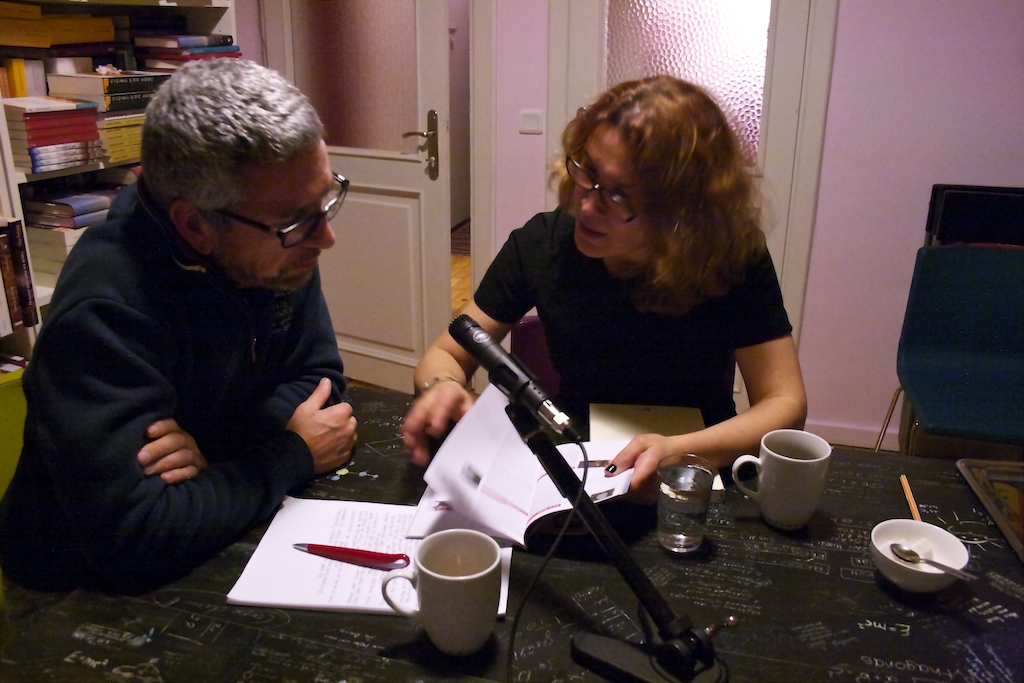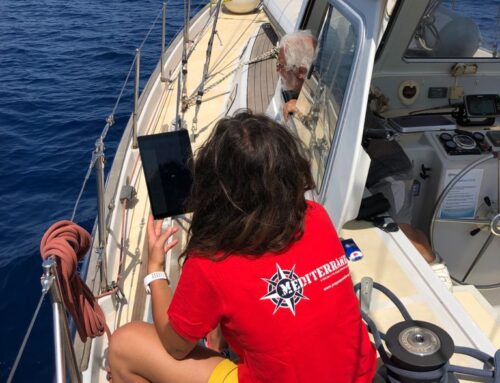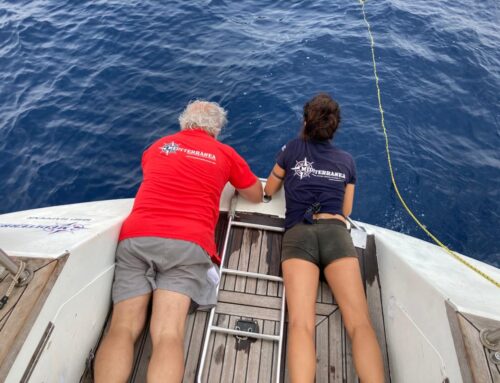
(by Simone Perotti)
In the Office of the most important Turkish literary agency, Kalem Agency, I breathe the smell of home. It is like entering the head offices of Consulenze Editoriali, the agency of Rosaria Carpinelli, at Vittor Pisani street in Milan. Instead we are in Istanbul, in the district of Galata, Beyoglu, on the Eastern side of the Golden Horn, the European district.
Here I meet Nermin Mollaoglu, who was born in Bulgaria and has been a Turkish Istanbulian since she was three years old, a handsome forty year old woman with quick deep eyes, whose head is slightly bent, like someone who is shy but quickly reacts to any reluctance. She represents about one hundred writers, an impressive number even for the largest American literary agency, and does so, from what I am able to understand, with truly amazing creativity and temperament, and in the scenario of the publishing world.
A world which, in Turkey, moreover, I know nothing about. I start therefore with a few questions about the cultural situation in Turkey. “Very good, I would say. We have many and diversified writers, of fiction and non-fiction. The Nobel prize of Orhan Pamuk literally had the attention of the world erupting on us. Since 2006 there has been a surge of interest that generated in a very little time more than 2000 titles, all of which have been translated into at least one foreign language. Naturally, you hear people complain, but it is not true that people don’t read. 1000 publishers, of which 150 are strong and active, is not a bad scenario. 30% of our readers are here in Istanbul, where we print 70% of the books. ” Nermin is well prepared, and not only rattles off data but also interprets them. “Several years ago the government decided to supply school books free of charge, and this gave a further boost to the entire industry.” Free books for everyone, I literally jump on my chair thinking about the Italian cuts to schools. “The Turkish editorial situation is however in great ferment. Many new publishers are opening, often by young people, and at least 50% of what we read in Turkey today is translated abroad. Which, in my opinion, is very important in order to travel, understand, gain knowledge and broaden the minds of our people.”
I want to know what is happening here, what role do writers have, and I want to talk about freedom of opinion. Nermin gets right to the heart of the matter. “We have three categories of writers, one of which is the commercial writers’ category. The other two are politically and socially active writers, one is left wing and the other right wing.” A fascinatingly clear analysis. While she talks I try to imagine what I would say in Italy, or what they would say in Greece, where we have just been for almost six months. “But everyone has a great following, a clearly defined role, and at least ten of them have more than a million followers on the social networks, which are the main organs of information and communication. Above all because very few write for newspapers, considering that on the traditional media if you have an opinion that is considered embarrassing by someone in power, you are excluded as a collaborator. I suppose it’s the same in Italy.” I would say that she is wrong here, but I realise that she does not want to give too much emphasis to what she has just said, considering it, in some way, physiological.
And what about censorship? “On books there is no censorship, but often it is not needed. Self-censorship does a great job in itself. Since the 80s we have our famous Law 301 which is a very sharp tool: if a reader feels upset about something that he reads in a book, he has the right to apply to the court of justice and the author, publisher and translator risk severe penalties, not just fines: imprisonment. So I would say that they are all pretty careful about what they write.” Damn! I think of how many people have sent me e-mails filled with brimstone and black rage, about some of my books. If we had a 301 in Italy I think I would have been given at least twenty years. A scorpion runs up my back. And a question: what would I write if I was afraid? A question that a writer should not have to ask. He might not like the answer.
According to Reporters Without Borders,Turkey ranks 148th out of 178 as regards freedom of the press (Italy has nothing to smile about however considering that it ranks 61st between Guyana and the Central African Republic), while according to the European Journalism Observatory, Turkey leads the classification of countries with the largest number of journalists in prison for crimes of opinion. I’m not a great defender of journalists, and I know some that I would like to see, if not in prison, at least disbarred, but the figure, if confirmed, is impressive. Indeed, studying the biographies of the authors that we meet or read here, I often find references to periods of imprisonment or self-imposed exile to avoid prison. Nermin however, as I ponder these data, dampens the fire: “Things are improving however. When I was a child it was not easy, and sometimes even impossible to find a book that spoke of thorny issues or minorities or a critical interpretation of certain political periods or internal and external wars. Today, on the other hand, if you go to the library you realize that there are many of these books, and they are on the increase, even with opposing opinions, thus with much more opportunity for the reader to form opinions freely. ” I ask her if there is nationalist literature exists in the Country. “Of course it exists, and it is very strong! Even on television. Some time ago a TV series about the period of the Ottoman Empire kept everyone glued to the TV screens for something like three years. On the evening they ran last episode I remember walking around the city. There was no one around! Even my parents were at home watching TV.” We smile. Then she suddenly becomes serious again. “Turkish literature, however, is always suffering. These and many other questions have generated pain … and we find traces often, everywhere, between the pages of books.”
To bring our conversation back to a lighter note, I ask her about Italy: “It is not a market from which we translate a great deal, and Italian writers do not rise in the charts, but we do translate them, there are good writers, and I would say that the publishing exchange is growing.”
Do you feel Mediterranean, Nermin? I ask her this, to understand what an educated woman like her thinks, she who is of Bulgarian origin, Turkish and Istanbulian by education and election, who travels, sees the world, and follows the great human processes in the media. “If we want to be precise, I feel that I am Balkan. Or a citizen of the City (editor’s note: that is what the Turkish call Istanbul: the City), which is the centre of the world” she laughs, but this is a concept that appears very often. Istanbul, the ancient Constantinople and the even more ancient Byzantium, is famous for this, it gives you this feeling. They also call it the the City of Cities. I ask her if she hasn’t wanted to avoid my question, considering that the Balkans are in the Mediterranean. “Yes, you’re right. Well, let’s say this: I certainly feel closer to the Greeks and the Arabs than to the Swedes. Will that do? I’ll tell you a story: My mother had always said that if she did not marry a man of the sea, one that was born on the coast and had dealings with the sea, things would not go well. That I would say that is very Mediterranean, is it not?! Undoubtedly the feeling of a Mediterranean nature exists here in Turkey, although I would say that it belongs more to the Aegeans and the Anatolians of the South rather than to those of the North”.
We start to talk about Europe: “Europe was united by a common religion, I believe that this will hinder any process of unification in the Mediterranean”. I point out to her that that particular “glue” did not prevent centuries of war and that while people were thinking of uniting Europe, there were two world wars. I would say that the Mediterranean has a head start. Nermin agrees with me. I realise that Nermin is perhaps considering the question of the Mediterranean for the first time now. A feeling that I have often had during my meetings, and that makes me think. Are we really at the dawn of such an important consideration; this is on one hand discouraging, and on another hand exciting for the mind of the writer and dreamer.
What is needed, and from where would you start to reason on a Mediterranean dialogue and a future citizenship of this area of the world? “From knowledge. I was thinking just a moment ago, while you were talking, that I could mention fifteen or a maximum of twenty writers from 29 countries who will visit the Mediterranea. Yet I read a great deal, I work in publishing and writers are my daily bread. Is that not indicative? Perhaps it is necessary to the Mediterranean. What we have suffered in recent years has been an Americanization, not globalization. One has to travel around the Mediterranean, as you do, understand, listen, learn, read, disseminate. Mutual knowledge is the basis of each and every process on this theme.”
Nermin tells me about the ITEF(International Tanpinar Edebyat Festivals – Istanbul Tanpinar Literature Festival), which she organises and founded seven years ago. A book festival of great importance, to which I want to add a section whose focusis on the Mediterranean. We speak a little longer, and then realise that the interview is over. She asks me about my books, and in a completely informal but sincere manner, suggests that we release my next novel in Italy and Turkey at the same time. Nermin goes fast. Who knows if people like her may indeed accelerate the many processes in our great sea.





Leave A Comment